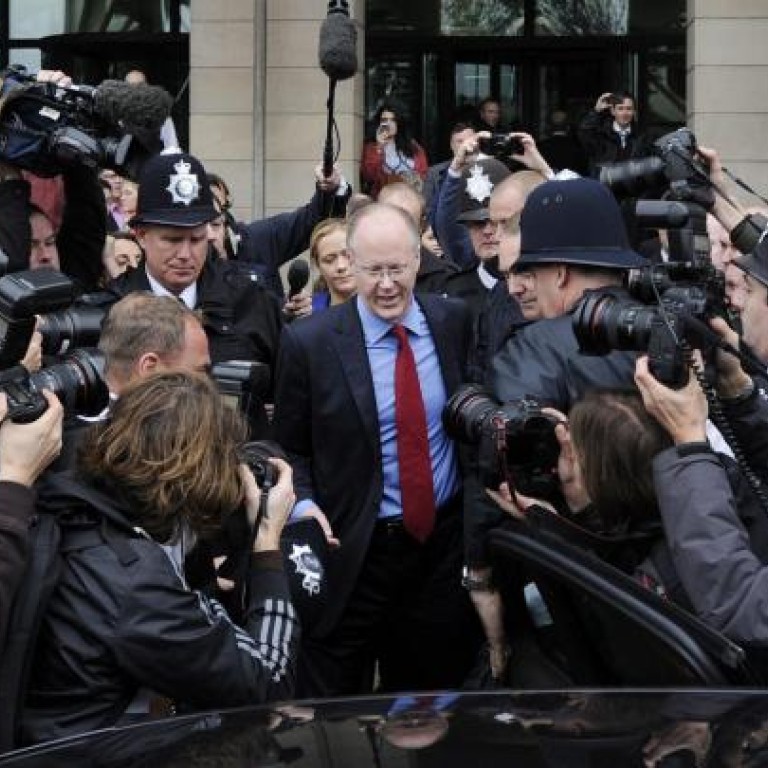
BBC boss Entwistle finished before he really got started
George Entwistle had bold plans for the corporation, but his tenure had barely begun when he was embroiled in scandal at the broadcaster
George Entwistle came to the top job at the BBC with 23 years of hands-on experience at the corporation, but it was his ignorance of what was happening below him that caused his downfall after just 54 days.
The 50-year-old did not have an easy time as director-general, taking office just two weeks before the scandal broke over Jimmy Savile, the late BBC star accused of sexually abusing hundreds of children over 40 years.
Entwistle was then dealt a second blow on Friday when the broadcaster's flagship programme, which he once edited, was forced to apologise for wrongly implicating a senior political figure in sex abuse at a children's home.
Announcing his resignation in front of a pack of television cameras outside BBC HQ on Saturday night, Entwistle said he was taking ultimate responsibility for the "unacceptable journalistic standards of the film".
But for many critics it was the perception that he had lost control of the BBC that meant he had to go.
Entwistle was already under pressure after an underwhelming performance before lawmakers last month, where he was asked to explain why a investigation into allegations against Savile was dropped last December.
One MP berated his "extraordinary lack of curiosity" about the report, which was being prepared at the same time as a Christmas tribute to Savile that Entwistle himself had approved in his then job of director of BBC Vision.
The press subsequently dubbed him "Incurious George", a reference to the US animated series .
When the scandal broke last week, Entwistle revealed that he had not known about the programme's report implicating a former aide to Margaret Thatcher in child sex abuse until after it was broadcast.
In a bruising interview with BBC radio on Saturday morning, he also admitted to missing a newspaper report on Friday suggesting that the accusation was wrong, and had been based on a case of mistaken identity.
Top BBC journalist Jonathan Dimbleby remarked afterwards that the organisation was "like a rudderless ship heading towards the rocks".
Former minister David Mellor said Entwistle had come across as "so out of touch it made me think Winnie the Pooh would have been more effective".
Following Entwistle's resignation, however, Dimbleby paid tribute to his former boss, saying he was a "thoroughly decent man" who was let down by those around him. "Clearly, George was at the receiving end of nothing when he should have been knowing everything," he said.
Dimbleby said Entwistle had also been dealing with the legacy of cuts to the corporation imposed under his predecessor, Mark Thompson.
This argument was also made by Jeremy Paxman, the presenter of , who blamed Entwistle's departure on "cowards and incompetents".
In a typically combative statement, Paxman said the BBC had been so scarred by the criticism it endured over its reporting of the build-up to the Iraq war in 2003 that it decided to "play safe by appointing biddable people".
"I had hoped that George might stay to sort this out. It is a great pity that a talented man has been sacrificed while time-servers prosper," he said.
The chairman of the BBC Trust, Chris Patten, also paid tribute to Entwistle, whom he appointed. He described him as a "very, very good man - cerebral, decent, honourable, brave", and said the crisis he faced "would have overwhelmed a lot of people with those sort of skills".
Entwistle joined the BBC in 1989 as a trainee after working on magazines for five years after university, during which time he had been repeatedly turned down for BBC jobs.
The politics and philosophy graduate climbed swiftly through the ranks, working on the investigative show before joining and rising to become its editor in 2001.
Several executive posts across the network followed from 2004, and he finally became director of BBC Vision last year, before taking over as director-general in September with big plans.
"My hunch is that there isn't a single bit of the BBC that, in places, can't do better," Entwistle told the magazine.
